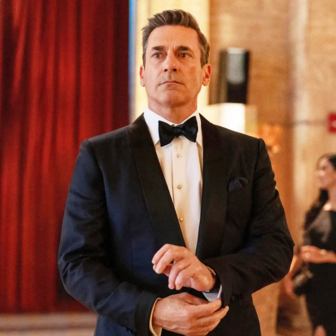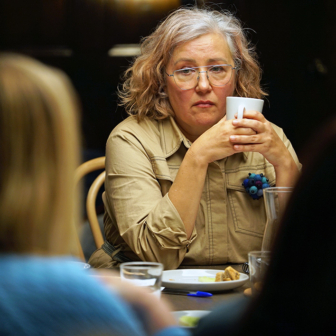Some of this year’s strongest television offerings existed at the lighter end of the spectrum, where “lighter” can mean witty and dynamic in mood, ingenious rather than frivolous, and anything but bland.
Innovative comedy series of this kind generally start with the perennial ingredient: people behaving badly. After all, isn’t originality always born of a re-engagement with tradition? The comedic spark is ignited by a situation in which the social pathologies of the time can be concentrated. Whether they are ill-mannered, unprincipled, clueless or just plain nasty, people who behave badly typically get away with it because they are in a controlling position.
Basil Fawlty made a small seaside hotel his fiefdom in Fawlty Towers (1975–79), where its writer and star John Cleese could draw a gallery of blinkered lower-middle-class types into his orbit. Fawlty, reincarnated for a new era by writer Mike White in last year’s HBO series The White Lotus, becomes Armond, manager of a luxury resort in Hawaii, a place of wish fulfilment for people who don’t know what they want.
In a stand-out performance from Australian actor Murray Bartlett, Armond evokes Fawlty’s sycophantic smile, along with the hysterical rage it tries to mask, but here it is he who is at the mercy of guests whose narcissistic aggression may be provoked at the slightest shortcoming in the standards of service they expect.
The balance of social control in this dreamy, idyllic retreat is as unstable as the volcano that overlooks the scene. One of White’s achievements is to combine the ingredients of a television sitcom with cinematic qualities of sound and setting that serve to expand the dramatic scale. Characters who seek to enhance their lives through self-gratification find themselves pitched into another order of experience as farce slides towards tragedy.
It is not necessary to watch the first season of The White Lotus to find orientation in the recently released season two, screening on Binge, which has an almost entirely new set of characters and storyline, and is set in a resort high on the cliffs in Sicily. Instead of spine-tingling a cappella Hawaiian chants, the great arias of Italian opera swell with the waves. The massive presence of ocean and a glowing volcano are again dominant.
White, who has background in reality TV — notably Survivor — says he is fascinated by how behavioural patterns can shift under pressure, revealing unseen sides of a personality. Such a premise creates the kinds of opportunities good actors relish, and the cast for this new season is as good as it gets.
As their entangled storylines evolve, the characters begin to echo the dramatis personae of Italian opera, equal parts Puccini and opera buffa. Tanya, who presents at first as an overblown but talentless diva, tragic only to herself, defies any typecasting as her yearning for admirers draws her into ever deeper waters. Jennifer Coolidge won an Emmy for the role in season one, and her finely tuned sense of tone and register is integral to the creation of White’s unorthodox dramatic mode in the sequel.
She is well matched with Tom Hollander as Quentin, a very British, very gay adventurer with a virtuoso line in flattery. His yacht party of apparently vacuous pleasure-seekers are a counterpart to the close-knit Di Grasso family, a father, son and grandfather whose Sicilian roots and macho propensities suggest mafia heritage, a connotation strengthened by the casting of Soprano star Michael Imperioli as Dominic and F. Murray Abraham as his incorrigible father.
The most sinister qualities are not, however, to be found where we might expect, and there is a sense that almost anyone here might turn very ugly at some point. The marital tensions of the two young couples who dine together on the terrace overlooking the spectacular coastline are brought to a slow boil, while the two good-time girls who light up the scene every time they appear (played by locals Beatrice Grannò and Simona Tabasco) bring plenty of trouble in their wake.
Adhering to the tighter conventions of the true sitcom is the BBC series Motherland, awarded the 2022 BAFTA for best scripted comedy in its third season. Co-creator Holly Walsh, who heads a team of six in the writing room, demonstrates how the ensemble approach can work in both cast and production, and that sitcom, at its best, is a true, if minor, art form.
With a twist on the classic BBC sitcom Absolutely Fabulous, we have middle-class mothers collectively behaving badly. For their children, who remain in the background, the panic stations are evidently just business as usual.
Vying with each other in the worst-behaved stakes are Julia (Anna Maxwell Martin), a professional event planner driven to hysteria by the challenge of planning the daily trip to school on time, and the vain and posturing Amanda (Lucy Punch), who seems to have nothing to do but organise social events for a coterie of friends. The in-group and the out-group occupy tables at opposite ends of the local cafe.
Julia’s out-group includes Liz (Diane Morgan), dour and unflustered even when she nearly severs a finger trying to cut the cheese she keeps in the freezer, and the self-effacing Kevin (Paul Ready), a full-time dad. When Meg (Tanya Moodie) arrives in the neighbourhood, she appears to bring some savvy maturity to the situation, until her reckless party spirit reveals itself.
The sidelining of children might cause concern in some circles, but the storylines are skilfully managed to display pathologies born of incompetence and fuelled by anxieties that come of caring too much rather than too little about primary responsibilities. At the heart of it (and there is some genuine heart in this series) is an honest sideswipe at the assumption that “mothering” comes naturally, and that most of us even know what it is when we find ourselves in the midst of it.
For those whose tastes run to sterner stuff, HBO’s Tokyo Vice is screening on SBS. Based on Jake Adelstein’s book about his experiences as a young American reporter working in Tokyo in the early 1990s, the story tracks his journey into the underworld of heavily ritualised organised crime syndicates known as yakuza.
Against all the odds, he gains a position with Tokyo’s leading newspaper and is assigned to report on crimes under strict protocols dictated by the police. Primary among these, as he learns on his first case, is that “there is no murder in Japan” and published accounts must be composed accordingly.
Protocol here is an iron hand not always concealed in a velvet glove. Breaches earn a dressing-down in front of colleagues in the arena of the newspaper office; if the infringement involves yakuza codes, there may be resort to tempered steel.
Under such constraints, the prospects for an investigative reporter, and a cultural outsider at that, are far from promising, at least until he is taken up by a senior detective with an equal determination to penetrate the hornets’ nest. And so the yakuza chiefs meet their match in an unlikely partnership between a maverick American and a sternly honourable Japanese police detective.
There are no spoilers here — the end of the story is signalled with a flashforward in the pilot — and there is a sense in which the narrative is itself a ready-made convention, even if it is based on Adelstein’s documented experience.
The parallels with Ridley Scott’s 1989 film Black Rain are hard to miss. Ken Watanabe, who plays the detective, has the same quiet charisma and sophisticated gravitas that Ken Takakura brought to the role of the police inspector in Scott’s film. And again there is an American night-club hostess (Rachel Keller succeeds Kate Capshaw in a more edgy interpretation of the role), sufficiently immersed to have crossed the boundary that keeps out gaijin (ignorant foreigners) and well placed to assist with connections.
In marked contrast to the film, though, the American lead is no crass cultural ignoramus like Michael Douglas’s NYC cop. Adelstein, played by Ansel Elgort, speaks fluent Japanese, trains in aikido with a master, and consciously studies cultural conventions. Elgort himself brings five years of dance training to the martial arts work, and spent nine hours a day learning Japanese in the months prior to filming.
The storyline might ultimately be another version of a favourite American narrative about helping foreign cultures with what they apparently can’t do for themselves, but the quality of filming and dramatic interpretation makes this a compelling series. Filmed entirely in Japan, its sense of milieu is superb.
Scenes in the huge open-plan newspaper office, the highly charged atmosphere of nightclubs haunted by dangerous clients, and the ritual bathing precincts where yakuza drop their robes to reveal fearsome whole-body tattoos: all are evoked as if in real time. The numerous “extras” in these scenes are not extra at all, but integral to the potent social dynamic.
SBS is releasing episodes weekly, so if you want to binge you may have to wait till New Year for the full season. •




